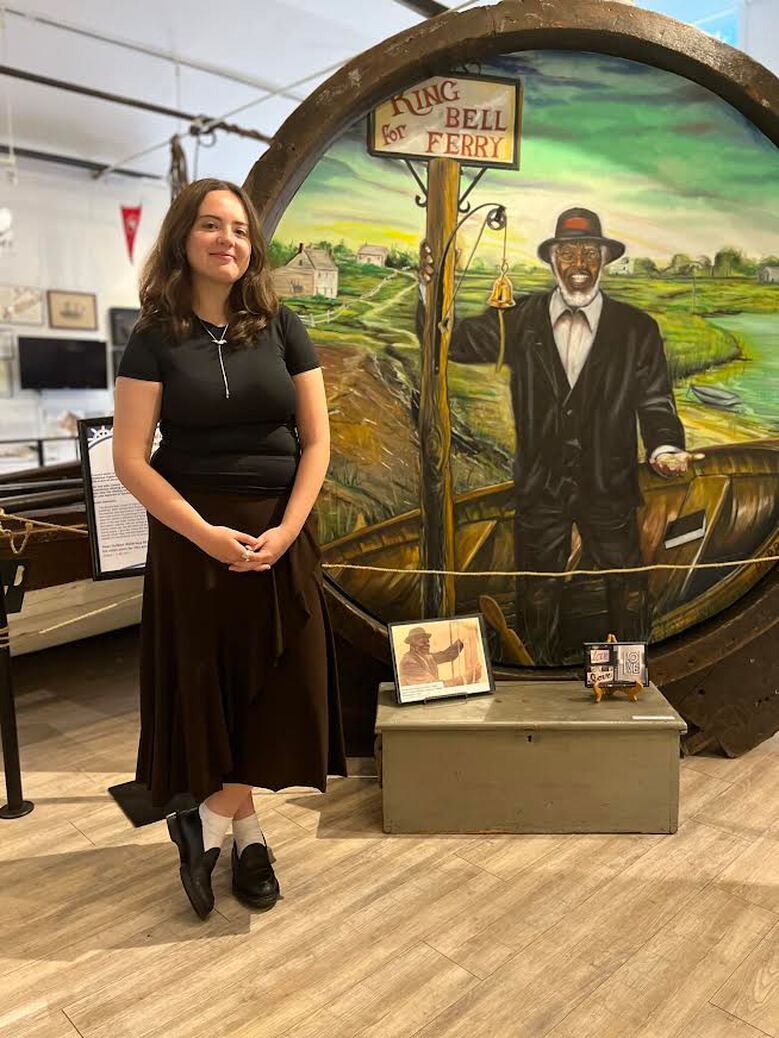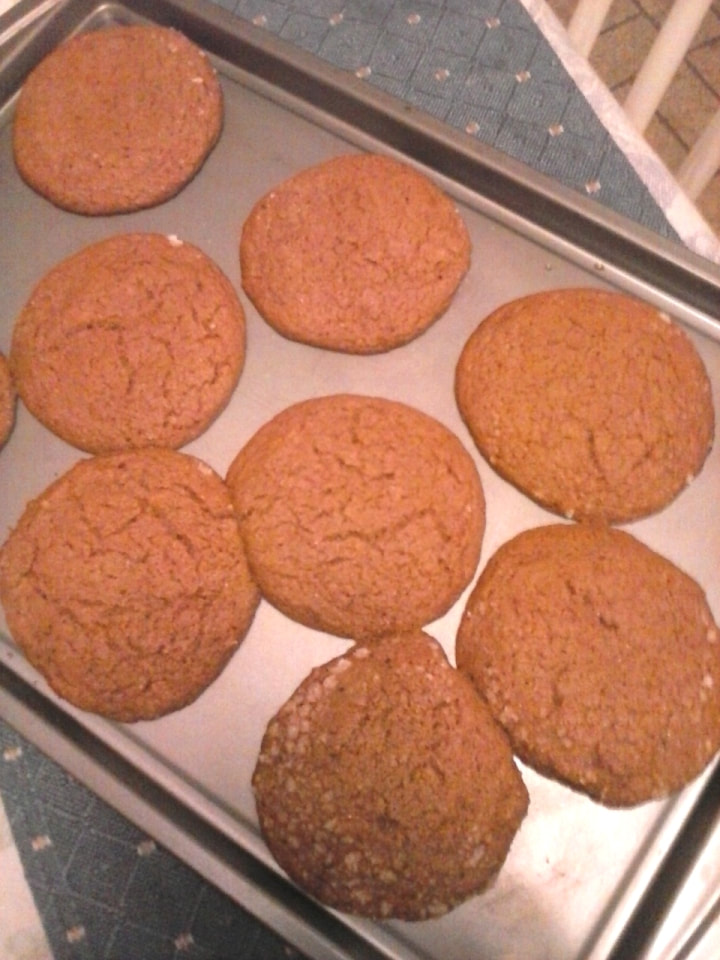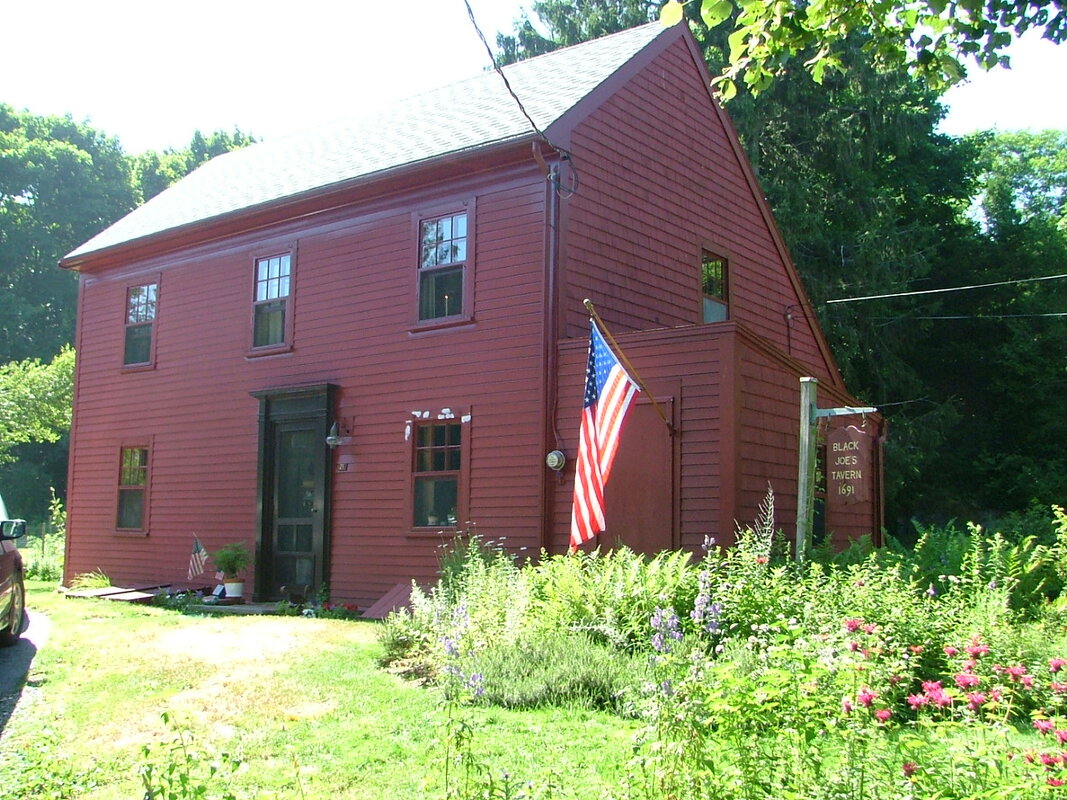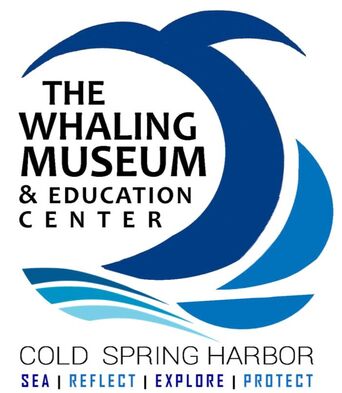by Claire Spina |
| New York artist Hulbert Waldroup captures Concer’s heroism in a two-sided portrait painted on salvaged ship wood. One side shows Concer at work, bravely aiming his harpoon at a whale. On the opposite, he stands along a shore, grinning as he extends a hand towards us. Waldroup’s piece allows viewers to interact with Concer in two different environments, one that demonstrates his remarkable courage and professional success, and one that emphasizes the valuable spirit of Concer as an individual, beyond his achievements at sea. In employing this duality, Waldroup communicates the importance of Concer’s contributions, without reducing him to a token or statistic. “I give the viewer the opportunity to find and reshape the spaces where they find themselves,” says Waldroup in his artist statement. His rendition of the story acknowledges the unlikely circumstances of Concer’s success while maintaining a sense of optimism and endurance that bears relevance today. This balance is a persistent aspect of “Whalers of the African Diaspora.” Despite the heavy subject matter, an inspiring narrative runs through the exhibition, highlighting the unique contributions of every whaler, innovator, and artist involved. The show extends beyond those at sea, honoring the impact of African Americans on spirituality, culture, labor laws and innovation. Each artifact on display – from ship parts to scrimshaw carvings– are powerful symbols of Black whalers’ presence in the industry, both on and offboard. As Grier-Key puts it, “My hope is that the viewer comes away with new knowledge that is a deeper understanding of not just remarkable achievements but the ordinary spirit of service and justice that is within all of us to bring about change.” Given the show’s inspiring subjects and stories, Grier-Key’s statement rings true. By celebrating those who changed the course of the whaling industry, “Whalers of the African Diaspora” offers everyone the opportunity to learn, grow, and make a difference. |
While developing content for our new special exhibit, "From Sea To Shining Sea: Whalers of the African Diaspora," museum staff came across a recipe for for an oversized ginger cookie dating back to colonial times -- the Joe Frogger Cookie.
The cookie's creation is attributed to Lucretia Young, who was born in 1772 to two formerly enslaved people in Marblehead, Massachusetts, a seaport. She married Joseph Brown, the son of an African American mother and Wampanoag Nation father, and who had been born into slavery to Rhode Island sheriff slaveowner Beriah Brown II. Little is known of Joe's early years, but he enlisted as a soldier in the Revolutionary war to take the place of his enslaver's son, who Joe said "left the company to go privateering." Beriah promised his liberty if he would serve out his son's time. Joe completed his enlistment in 10 months and 20 days, serving with 60 other men, and left the war a free man.
During a time when unemployed freed Black people had to leave Marblehead, Lucretia and Joe operated a successful and busy tavern serving sailors. The building still stands today.
There, Lucretia mixed sea water, rum, molasses, and spices to create a large, gingerbread-like cookie which sailors bought by the barrel - The Joe Frogger. While the exact origin of the name is unclear, as legend has it, she named the cookie after her husband and the nearby pond's wide, flat lily pads. Because the cookies lacked milk or eggs, the rum-preserved cookies had a long shelf life suitable for sea voyages, and were popular with fishermen and sailors.
Joe and Lucretia were free people and property owners in a time when most African Americans were enslaved, yet its star ingredients— rum and molasses—are inextricably tied to the brutality of slavery.
| Recipe: Joe Frogger Cookies 3½ c flour | 1½ tsp sea salt 1½ tsp ground ginger | ½ tsp ground cloves ½ tsp grated nutmeg ¼ tsp allspice | 1 tsp baking soda 1 c molasses | 1 packed cup brown sugar 2 tbsp white sugar ½ c room temp butter, margarine, or shortening 2 tbsp dark rum 1/3 c hot water Mix dry ingredients; set aside. Beat together the molasses, brown sugar, and your chosen fat until fluffy. In separate bowl, combine hot water and rum. Stirring continuously, alternate adding the dry ingredients and the water-and-rum mixture to the sugar-and-molasses mixture. Continue stirring as the mixture coheres into a dough. Cover and refrigerate for at least two hours and up to a day. Preheat oven to 375. Roll out the dough on parchment paper sprinkled with sugar until it’s about ¼ of an inch. Use an empty coffee can or a wide jar to cut out circles in the dough (traditional Joe Froggers are large, like lily pads). Bake on greased or parchment paper–lined baking trays for 10 to 12 minutes until beginning to brown on the edges, and are still slightly soft in the center. Share your pics @ cshwhalingmuseum! |
Why
Follow the Whaling Museum's ambition to stay current, and meaningful, and connected to contemporary interests.
Categories
All
Black History
Christmas
Fashion
Food History
Halloween
Individual Stories
July 4
Medical Care
SailorSpeak
Thanksgiving
Whale Biology
Whales Today
Whaling History
Whaling Wives
Archives
January 2024
August 2023
March 2023
February 2023
September 2022
February 2022
October 2021
July 2021
June 2021
February 2021
November 2020
May 2020
April 2020
February 2020
December 2019
September 2019
August 2019
June 2019
May 2019
February 2019
December 2018
October 2018
August 2018
July 2018
June 2018
April 2018
March 2018
February 2018
October 2017
August 2017
July 2017
June 2017
March 2017
October 2015
Author
Written by staff, volunteers, and trustees of the Museum!





 RSS Feed
RSS Feed
